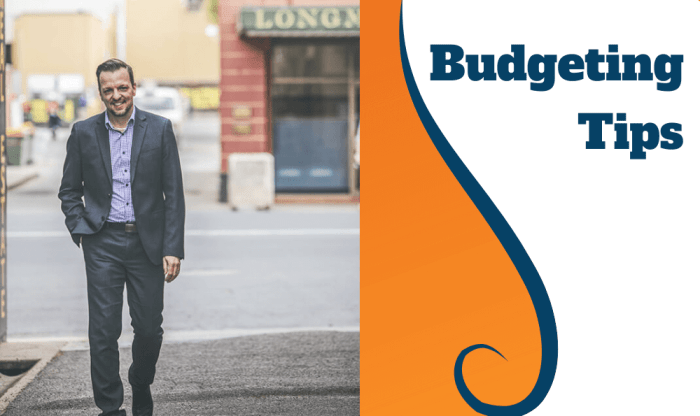Budgeting tips are the key to financial success, and this guide will show you how to navigate the world of personal finance like a boss. From creating a budget to saving money and managing debt, get ready to level up your money game!
Are you tired of living paycheck to paycheck? Want to take control of your finances and build a secure future? Then keep reading to discover the ultimate budgeting tips that will transform your financial life.
Importance of Budgeting

Budgeting is a crucial aspect of financial stability as it helps individuals and families track their income and expenses, ensuring that they live within their means and avoid unnecessary debt. By creating a budget, one can prioritize financial goals, save for emergencies, and plan for the future. Without a budget in place, it is easy to overspend, accumulate debt, and struggle to make ends meet.
Examples of Financial Success Through Effective Budgeting
- Building an emergency fund: By budgeting and setting aside a portion of income for emergencies, individuals can avoid financial crises when unexpected expenses arise.
- Debt repayment: A budget helps individuals allocate funds towards paying off debts, leading to financial freedom and reduced stress.
- Planning for major expenses: Budgeting allows individuals to save up for big purchases like a home, car, or vacation, avoiding the need for loans and interest payments.
Impact of Not Having a Budget
- Living paycheck to paycheck: Without a budget, individuals may struggle to cover basic expenses and end up relying on each paycheck to survive.
- Accumulating debt: Lack of budgeting can lead to overspending, credit card debt, and high-interest loans, trapping individuals in a cycle of debt.
- No financial goals: Without a budget, it is challenging to set and achieve financial goals, such as saving for retirement, education, or other milestones.
Creating a Budget
Creating a budget is essential for managing your finances effectively. It helps you track your expenses, save money, and achieve your financial goals.
Step-by-Step Guide to Creating a Basic Budget
- List all sources of income: Start by recording all your sources of income, including salary, bonuses, and any other earnings.
- Track your expenses: Keep track of all your expenses, from fixed costs like rent and utilities to variable expenses like groceries and entertainment.
- Categorize your expenses: Divide your expenses into categories like housing, transportation, food, and entertainment to get a clear picture of where your money is going.
- Set financial goals: Determine your short-term and long-term financial goals, such as saving for a vacation or paying off debt.
- Create a budget: Based on your income, expenses, and financial goals, create a budget that allocates specific amounts to each spending category.
- Monitor and adjust: Regularly review your budget, track your spending, and make adjustments as needed to stay on track.
Tips on Categorizing Expenses in a Budget
- Use broad categories: Group similar expenses together under broad categories to simplify your budget.
- Be detailed: Break down categories into specific items to get a more accurate picture of your spending habits.
- Include savings: Don’t forget to allocate a portion of your budget to savings and emergency funds.
- Regularly review: Update your budget categories as needed to reflect changes in your spending patterns.
Importance of Setting Realistic Financial Goals Within a Budget
Setting realistic financial goals within your budget gives you a clear target to work towards. It helps you stay motivated, track your progress, and make informed financial decisions. By aligning your budget with your goals, you can prioritize your spending and focus on what truly matters to you. Remember, the key is to set goals that are achievable and relevant to your financial situation.
Tracking Expenses: Budgeting Tips

Tracking expenses regularly is crucial for effective budgeting. It allows individuals to monitor where their money is going, identify areas where they can cut back, and stay on top of their financial goals.
Tools and Techniques for Tracking Expenses
- Utilize budgeting apps: There are numerous apps available that can automatically track expenses by linking to bank accounts and credit cards.
- Maintain a spending journal: Keeping a detailed record of every purchase can help individuals become more conscious of their spending habits.
- Use spreadsheets: Creating a simple spreadsheet can also be an effective way to track expenses, especially for those who prefer a manual approach.
Benefits of Analyzing Spending Patterns
Analyzing spending patterns from tracked expenses can provide valuable insights into one’s financial habits. By identifying trends and areas of overspending, individuals can make informed decisions on where to adjust their budgets. It also helps in setting realistic financial goals and achieving long-term financial stability.
Saving Money
When it comes to budgeting, saving money is a crucial aspect that can help you achieve your financial goals and build a secure future. By incorporating savings goals into your budget, cutting unnecessary expenses, and creating an emergency fund, you can set yourself up for success in managing your finances effectively.
Incorporating Savings Goals into a Budget
- Set specific savings goals: Whether it’s saving for a vacation, a new car, or an emergency fund, having clear and achievable savings goals can help you stay motivated.
- Automate your savings: Consider setting up automatic transfers from your checking account to your savings account each month to ensure you consistently save a portion of your income.
- Track your progress: Regularly monitor your savings goals to see how close you are to reaching them and make adjustments to your budget if needed.
Cutting Unnecessary Expenses to Save Money, Budgeting tips
- Audit your expenses: Take a close look at your spending habits and identify areas where you can cut back, such as dining out less frequently or canceling subscription services you no longer use.
- Shop smart: Look for deals, use coupons, and compare prices before making purchases to ensure you’re getting the best value for your money.
- Avoid impulse purchases: Before buying something, ask yourself if it’s a necessity or just a want. Avoid making impulse purchases that can derail your savings goals.
Creating an Emergency Fund
- Start small: Aim to save at least three to six months’ worth of living expenses in your emergency fund to cover unexpected costs like medical bills or car repairs.
- Keep it separate: Store your emergency fund in a separate account, such as a high-yield savings account, to ensure it remains untouched unless a true emergency arises.
- Replenish when needed: If you have to dip into your emergency fund, make sure to replenish it as soon as possible to maintain financial security.
Managing Debt
Budgeting plays a crucial role in managing and reducing debt by providing a clear overview of your financial situation. It allows you to allocate funds towards debt repayment, avoid unnecessary expenses, and prioritize your financial goals.
Prioritizing Debt Payments
- Start by listing all your debts, including outstanding balances, interest rates, and minimum monthly payments.
- Consider focusing on high-interest debts first to minimize the amount you pay in interest over time.
- Another strategy is the debt snowball method, where you pay off debts from smallest to largest regardless of interest rate to build momentum.
- Avoiding new debt is essential to prevent further financial strain and maintain progress in reducing existing debt.
Avoiding New Debt
- Limit the use of credit cards and only charge what you can afford to pay off in full each month.
- Build an emergency fund to cover unexpected expenses and reduce the need to rely on credit for emergencies.
- Avoid taking on new loans or lines of credit unless absolutely necessary and carefully consider the impact on your budget.
- Seek alternative solutions like negotiating payment plans with creditors or seeking financial counseling if struggling with debt.





